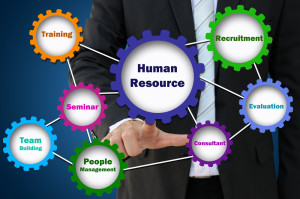What are the roles of a Human Resources professional in your organization? A common rule of thumb is that a company should have a dedicated HR function once it reaches 80 employees or so.
This post comes from a recent meeting of a business owner peer board that I facilitate. Many thanks to the group for this excellent analysis. The ratio of employees to HR specialists ranged from about 60:1 (for companies comprised mostly of professionals) to 120:1 (for those with a high percentage of production workers.)
 Everyone starts by hiring someone to administer benefits. That is more of a clerical position, and doesn’t necessarily require specialized education or training in human resources. Once we start writing paychecks for a professional HR manager, however, we often struggle to determine which higher level functions they should assume.
Everyone starts by hiring someone to administer benefits. That is more of a clerical position, and doesn’t necessarily require specialized education or training in human resources. Once we start writing paychecks for a professional HR manager, however, we often struggle to determine which higher level functions they should assume.
I’ve broken down the list of potential responsibilities into three categories, acquisition, retention and strategic support.
Acquisition: This is the first area of responsibility beyond benefits administration. The HR professional should be systematizing and supervising the recruiting process. Are all candidates going through the same interviewing process? How do you measure return on investment for advertising? Would the company benefit from an internship program, and how are interns selected and ranked? Which openings are worth retaining a headhunter, and which can be handled entirely in-house? How is a request for additional staff justified and approved? Is there a system for integrating new hires?
Retention: Are performance reviews conducted systematically, consistently and on time? Is training or mentoring available and utilized to help people move along on a career path? Are salary and benefits competitive with others in your industry, and with other companies in your area who seek the same type of workers? Is there a process for handling complaints objectively and in the same manner for everyone? The HR manager also assumes responsibility for morale, including regular employee satisfaction surveys and company events.
Strategic: These functions should be expected from an HR Director position. They include designing and purchasing insurance (in many companies, the third largest single expense item,) government compliance/reporting and succession planning for key positions. An HR Director can also project future labor costs for budgeting, and support the executive team with assessments of labor market conditions and potential threats to the company. They are also responsible for the company’s image in the community, and its role as a corporate citizen.
In a small business, every one of the responsibilities listed above are yours. I’m sure some of you are saying “That’s all nice, but I am running a business. I can’t spend all of my time on HR activities.” True; but if you grow they will become increasingly important, especially in tight labor markets like the one we are currently experiencing.
Whether you are hiring your first HR specialist, or have one who is asking “Where do I go from here?”, I think this list is a fairly comprehensive look at how much a good professional can do for your company. After all, you can’t do anything without your employees.
Do you think we missed something? Please add it in comments.
Do you know someone dealing with a similar issue? Share “Awake at 2 o’clock” with another business owner.

4 Responses to What Does HR Do?